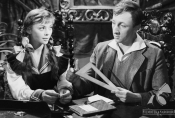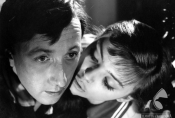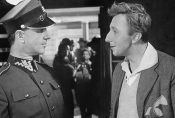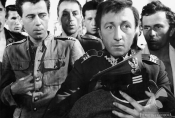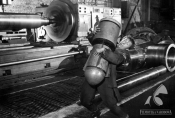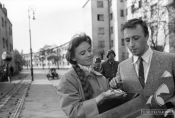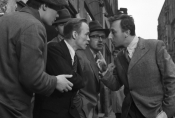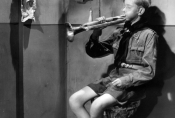BAD LUCK [1960]
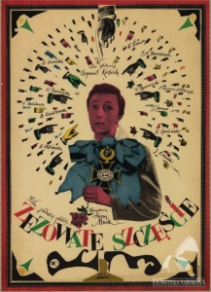
year:
- 1960
release date:
- 4 IV 1960
runtime:
- 107 min
directed by:
- Andrzej Munk
written by:
- Jerzy Stefan Stawiński
director of photography:
- Jerzy Lipman, Krzysztof Winiewicz
cast:
- Bogumił Kobiela [Jan Piszczyk], Maria Ciesielska [Basia], Helena Dąbrowska [Wychówna], Barbara Kwiatkowska [Jola], Krystyna Karkowska [wife of Major Wrona-Wroński], Barbara Połomska [Zosia, wife of Jelonek], Irena Stalończyk [Irena Kropaczyńska], Tadeusz Bartosik [Wąsik], Henryk Bąk [director], Mariusz Dmochowski [a Security Service officer], Aleksander Dzwonkowski [Cezary Piszczyk], Edward Dziewoński [Jelonek], Tadeusz Janczar [officer cadet Sawicki], Stanisław Jaworski [a clock-maker], Andrzej Krasicki [Witold Kropaczyński], Wojciech Siemion [HR officer Józef Kacperski], Wiesław Gołas [a Security Service officer]
edited by:
- Jadwiga Zajiček
music by:
- Jan Krenz
production design:
- Jan Grandys
produced by:
- Zespół Filmowy „Kamera”
executive producer:
- Wilhelm Hollender
awards:
-
• MFF Edinburgh (Scotland) 1960: diploma
• Warsaw Mermaid 1960
About the film
The film mocks the Polish myths of courage, steadfastness, and wartime heroism, instead contrasting them with the selfishness, cowardice and scheming of the anti-hero, is one of the main testaments to the post-stalinist criticism of the national romantic tradition and its imitators.
Warsaw, the 1930s. Jan Piszczyk has felt marginalised in life since his childhood. Considered a loser at home and at school, he comes to the conclusion that only the scouts can give him some standing among his peers. Playing the trumpet brings him momentary recognition, but during the parade a disaster occurs. Snuff poured into the trumpet by a malicious colleague discredits Piszczyk. At university, he decides not to engage politically. By chance, however, he gets caught up in an anti-Semitic demonstration and is beaten both by students and the police at the same time. He loses the chance to get tutoring and the hope for first love. Piszczyk decides to gain a position in society. He joins the Cadet School.
War breaks out and Piszczyk manages to reach the already deserted barracks, where he dresses up in someone else's uniform. At this point, the Germans enter and take him prisoner. In the POW camp his fellow inmates treat him with contempt and suspect him of co-operation with Germany. He volunteers to work in a German armaments factory. Released, he returns to occupied Warsaw, where he meets Jelonek, a former colleague. He sells currency and jewellery, doing shady business. He meets a girl and experiences his first great love. To impress Basia, he pretends to be a hero of the underground resistance. Bad luck still haunts him, and this deception ends in failure. After the war, Piszczyk works in the applications office of Mr. Wąsik. He saves up money, but because of a beautiful client he gets caught up once again in suspicious business and goes to jail for a few years. In the 1950s, Piszczyk starts from the beginning. He is now working in an important government office. He is an overzealous officer, law-abiding and pro-government. He is promoted, but at the peak of his career, disaster strikes: someone forges his handwriting and writes an anti-government slogan in the toilet. Piszczyk goes to jail again. Cleared of the charges, he is to be released soon. Horrified at the prospect, he begs the head of the prison to let him stay, but the man refuses.
Waldemar Piątek, Leksykon polskich filmów fabularnych, Warszawa 1996
Articles
-
“Bad Luck” or The Scissors by Andrzej Munk
Mariola Dopartowa
50 Years of Polish Film School, Warsaw 2008
